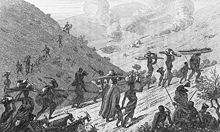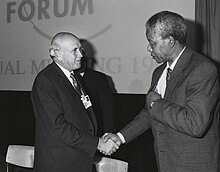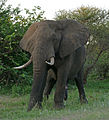Wikijunior Africa: South Africa

South Africa is a large country in southern Africa. It is bordered by Namibia, Botswana, Zimbabwe, Mozambique, Swaziland. Lesotho is an enclave (completely surrounded by South Africa) within South Africa. Interestingly, South Africa has 3 capital cities: Pretoria (executive capital), Bloemfontein (judicial capital) and Cape Town (legislative capital). Johannesburg is the country's biggest city.
Geography
[edit | edit source]
South Africa has a diverse geography from the crags of the Cape of Good Hope, to the Bushveld of Limpopo, and the peaks of the Drakensberg Mountains.
There are many iconic animals native to South Africa, many of their names come from Afrikaans, including:
-
Meerkats (Lake cat)
-
Springboks (Jumping antelope)
-
Aardvarks (Earth pig)
Others include:
-
Jackals
-
African bush elephants
History
[edit | edit source]

The Dutch first settled in what became Cape Town in 1652. They set up home in the Western Cape, but ended up fighting with the people who already lived there, the Xhosa, over rich land that could grow good crops. In 1806 the Cape became part of the British Empire after the Napoleonic Wars. During the early 19th century, in the southeast, the Zulu Empire began conquering neighbouring tribes and clans, who fled to nearby areas and two million people died fleeing from the deadly fighting. Meanwhile, the descendants of the Dutch settlers, who became known as Boers(Farmers) were angry with British rule and moved to the east, creating their own countries: Natalia, the South African Republic (Transvaal) and the Orange Free State. By 1902, the British had taken over all of modern South Africa.

In 1910, the colonies that made up South Africa formed a union, under the British monarchy, where they were allowed to rule themselves. But, only White people, some Coloured people and a few Black people could vote. In 1948, the National Party, a party founded by and for Afrikaners (people descended from the Boers), won the election and started something called "Apartheid", which meant that White, Black, Coloured and Indian people had to live separately and only White people could vote, even though only 1 in 5 people were White. In 1954 South Africa became a republic. During the 1980s, due to other countries refusing to sell things to South Africa, and people from within South Africa starting to fight against the government, the government began to change. In 1994, after years of talks between the government and Black South Africans, South Africa ended Apartheid and held elections where all adults could vote, with Nelson Mandela becoming South Africa's first president freely chosen by all the people.
Economy
[edit | edit source]People
[edit | edit source]There are 12 official languages in South Africa: Afrikaans, English, Southern Ndebele, Northern Sotho, Southern Sotho, Swazi, Tsonga, Tswana, Venda, South African Sign Language, Xhosa and Zulu. Afrikaans, Zulu and Xhosa are the most widely-spoken first languages although the majority of people know English as a second language.
Glossary
[edit | edit source]Colony: A place that is settled by people from another place
Monarchy: The kings and queens that rule an area
Descendant: Someone who is born from a family or group, think you from your parents and grandparents
Coloured people: The mixed descendants of the Dutch, British, Indians and the native South Africans
Indian people: The descendants of people brought by the Dutch and British to South Africa from India
 |
Wikijunior Africa | edit | |







